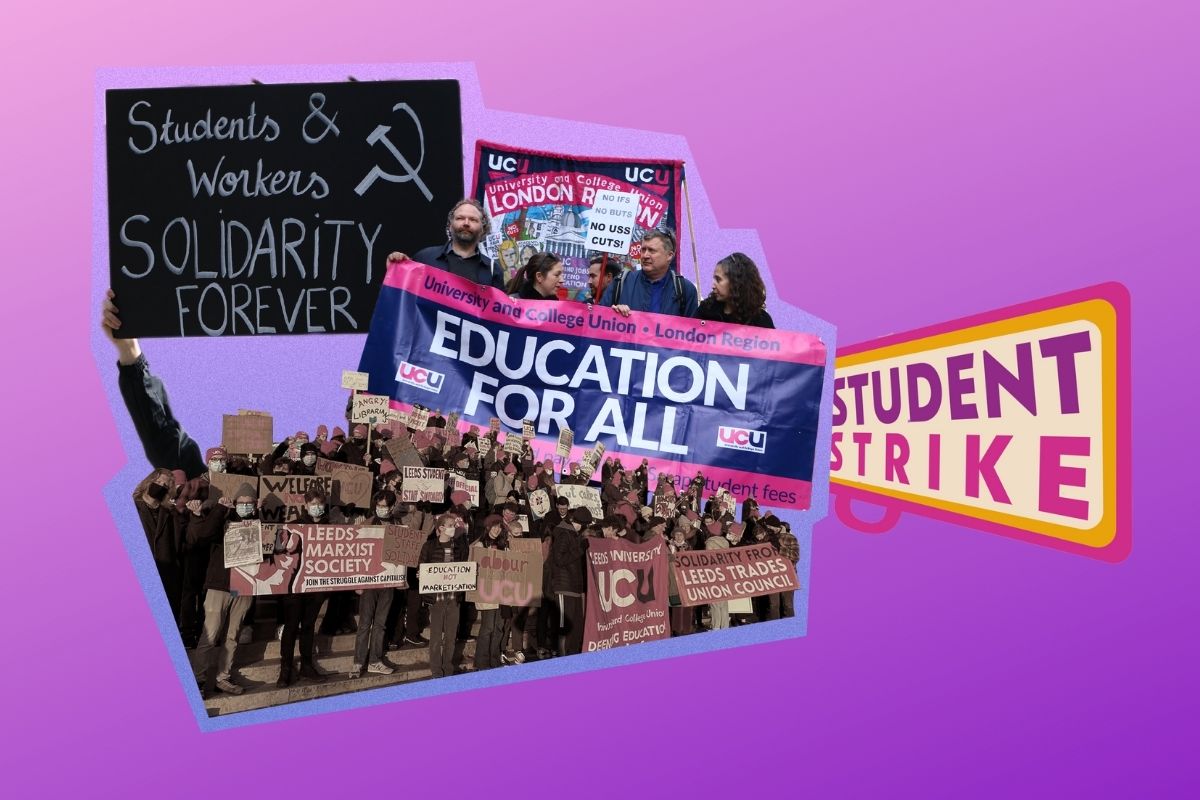Despite the huge radicalisation amongst young people, the recent day of action called by the NUS unfortunately saw a disappointing turnout. Local mobilisations show the potential that exists. We need fighting leadership and a socialist programme.
At the start of this year, the National Union of Students (NUS) called for a walkout on 2 March, to coincide with the end of the latest round of UCU strikes.
The NUS put forward four demands for the walkout: full funding for education; accessible education; lifelong education; and democracy in the education system. We fully support these demands.
Marxists argue that we need free education, accessible to everyone throughout their lifetimes, funded by the expropriation of the biggest businesses and banks in society.
These businesses have made huge profits off a well-educated population for decades; and big landlords have become rich off exploiting students for rent.
We have the wealth in society to fully fund free education, but it’s in the hands of a tiny number of profiteering capitalists. We need to take it off them.
Clearly, students can’t do that on their own. The organised working class, however, holds enormous potential power in society. So only by linking up with workers can students win free education.
That’s why coordinating the student strike with action by UCU members was such a good idea.
Strikes
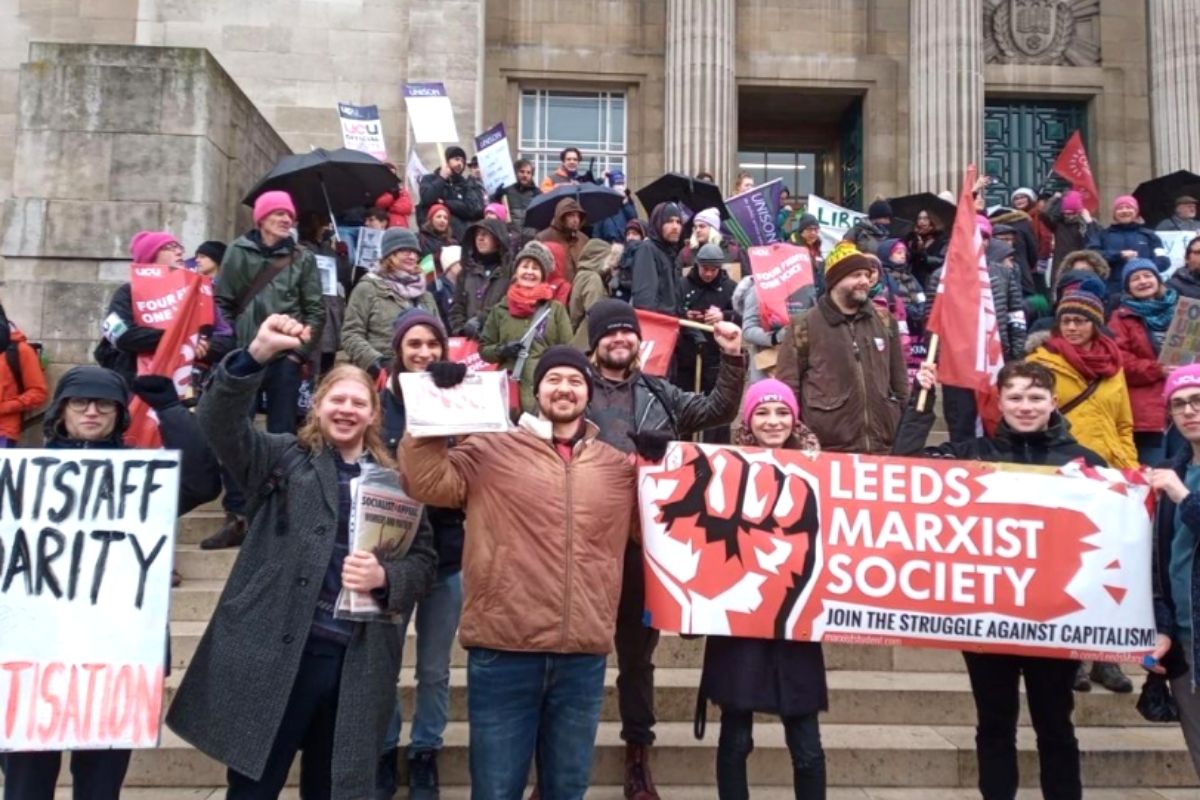
Comrades from the Marxist Student Federation (MSF) have enthusiastically thrown themselves into building student support for the recent UCU strikes, culminating in the planned walkout on 2 March.
On 26 campuses around the country, Marxist societies have held meetings for UCU members to explain to students why staff are striking. We’ve organised roving pickets to support staff on strike. And we hosted rallies on the last day of strike action in several cities around the country, including Sheffield, Birmingham, and Lancaster.
In Leeds, over 1,200 staff and students joined a demonstration through the city, in which the Marxist society played a key role.
Solidarity

Throughout the last few weeks, MSF activists have found that students were enthusiastic about the idea of supporting the UCU, and participating in a student strike.
Student solidarity on the picket lines was noticeably higher in many places than during the last round of strikes in December.
No doubt this is because the last few years have seen constant attacks from the Tories and bosses, which have hit young people the hardest.
This is set to continue, with skyrocketing inflation, and rents rising to barely affordable levels. Poor mental health support, meanwhile, alongside an increasingly precarious job market, has left students anxious about their futures.
Strategy
It is therefore a shame that the NUS was unable to capitalise on this mood among students.
What was needed were mass meetings of students and staff in every university, with political demands and strategy debated and voted on.
This could have been the springboard for extending the struggle to other trade unions on campus, bringing the entire higher education sector to a standstill. Unfortunately, however, the NUS proved unable to organise such a mobilisation.
The NUS-organised student strike was originally billed as a 100,000-strong demonstration through central London. In the end, it was a small rally of a few hundred people – a real disappointment for many of the activists who had worked hard to make it a success.
Potential
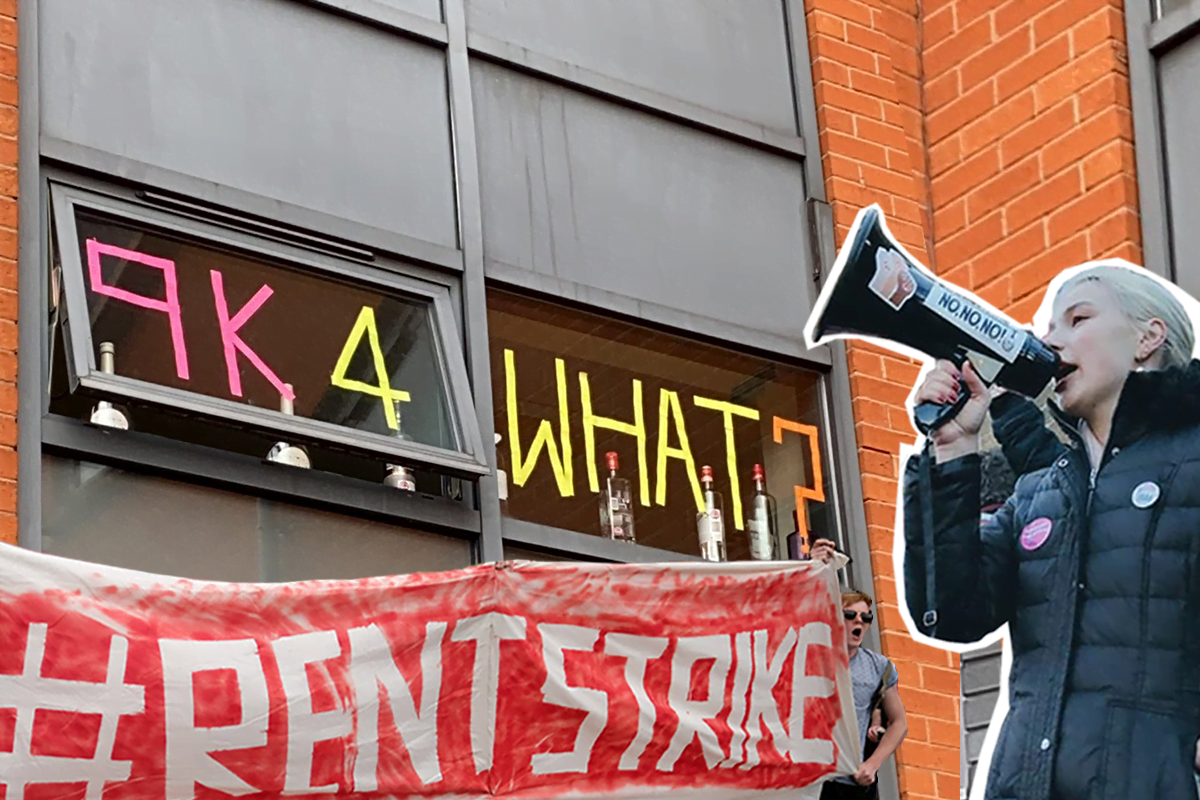
Why did this happen?
In the past, such as in the 2010 movement against tuition fee rises, the NUS mobilised demonstrations for free education that saw tens of thousands of students take part.
Today, students are in a worse position – and are more angry than before. The wave of rent strikes in universities last year is evidence of the militancy that exists. Despite this, the NUS walkout was unable to meet its potential.
The truth is, the NUS has slowly lost its authority in the student movement over the last decade. This is due to a string of right-wing leaderships, who have effectively dissolved the NUS into a toothless, apolitical body.
In 2019, for example, reforms were pushed through the NUS conference that slashed 50% of its budget, including most of its campaigning capacity.
Programme
Where the Marxist Student Federation (MSF) has taken a lead in organising rallies and marches across the country, our experience shows that successful action could have been organised by the NUS.
For example, in Leeds, the call for a mass demonstration saw an incredible turnout of 1,200 students and workers.
A key factor in the success of the Marxist societies was their preparation. Mass action did not happen spontaneously, or simply by announcing a demonstration and then expecting people to turn up.
In Leeds, for example, the Marxist society has built a strong relationship with the local UCU and Unison branches over the last year. The comrades set up the Leeds Student Staff Solidarity (LSSS) campaign, and organised for activists to be on the picket lines every single day to support striking university staff.
The comrades organised meetings on the question of free education, marketisation, and capitalism. UCU and NEU speakers were invited to address these meetings. This found an incredible echo.
The key ingredient is a fighting programme, which connected the question of free education to the fight against capitalism, alongside an established student and worker solidarity network.
Fightback
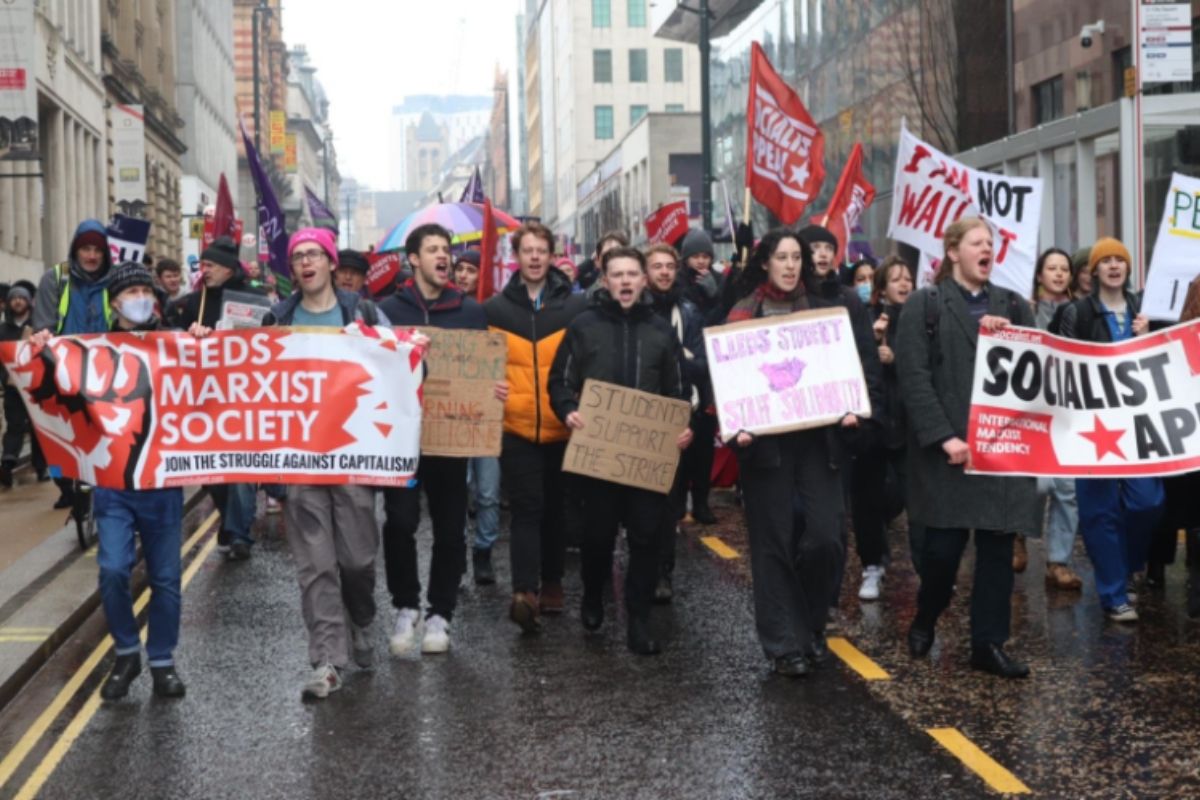
The demonstration in Leeds serves as a shining example of the potential that exists across the education sector to fight back. In Sheffield and Birmingham, we saw rallies of a few hundred people, which also reflects the political desire amongst workers and students to fight.
A new round of UCU strikes has already been announced for the end of March. Now is the time to reflect on these lessons and prepare for the next period of struggle.
We must do so by basing ourselves on a fighting socialist programme for free education that unites students and workers.
Leeds
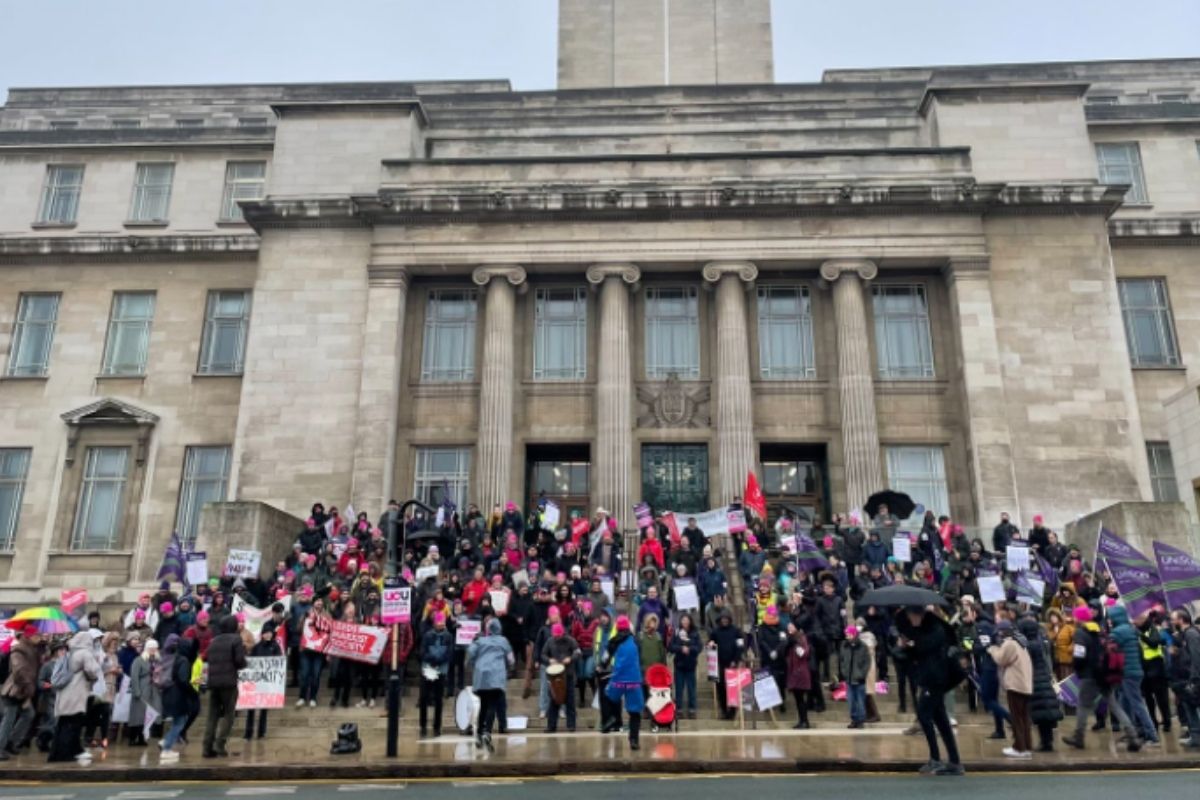
In Leeds, MSF comrades helped establish a campaign called Leeds Student Staff Solidarity (LSSS) during the last round of UCU strikes. This group of activists has campaigned in solidarity with striking members of the UCU at Leeds; and also, recently, with Unison members who have successfully taken strike action against low pay for the first time in nine years.
The LSSS campaign has dedicated its efforts to forging unity between workers and students, against the marketisation of our education. Marketisation is responsible equally for the dire working conditions of workers at universities and colleges, as well as the increasingly unaffordable and unacceptable student living standards.
As part of the NUS day of action called for 2 March, comrades in LSSS organised a protest march from the University of Leeds campus, through the city centre, and onto city square in Leeds.
Thanks to building for this alongside the UCU and Unison, a staggering 1,200 workers and students united in protest against the attacks on education and staff conditions.
With due diligence of publicising the event, forming relationships with local union workers, and earning the respect of the labour movement in Leeds by providing unequivocal solidarity to the workers, this protest was the largest of its kind in the country.
The mood was one of optimism and united action, with workers extremely grateful that the Marxist society stood in solidarity, and students inspired by the campaign.
Comrades chanted for the full duration of the march, with slogans such as ‘NO CUTS, NO LOSSES – TAKE IT FROM THE BOSSES!’ These were echoed by the crowd for the whole city to hear.
Once gathered in the city centre, comrades organised for a range of speakers reporting on behalf of the UCU, Unison, student climate coalition, the LGBTQ+ network, BLM, and student doctors.
Importantly, MSF activists explained why all these movements are connected through one common enemy: the rotten capitalist system.
The protest made clear how the consciousness of workers and students is transforming.
As Marxists, it is our duty to expose the root cause of austerity, cuts, unacceptable working conditions, dire living standards, and oppression. All these ills are caused by the capitalist system itself, and the greedy profiteering of the ruling class.
As we have shown in Leeds, unshakeable solidarity can be forged between workers and students. United, we will never be defeated!
Sheffield
Despite horrible weather, 300 Sheffield students and staff rallied together on 2 March to call for free education, with proper pay, pensions, and conditions for all workers.
The local Marxist societies took a lead in building for these strikes, rallying together student activists from across the city to support striking staff.
There was a march through town to the University of Sheffield Students Union, where students and staff took over the building for the day to have teach-outs.
Discussions were led by school and university student activists, UCU members, as well as local members from other trade unions, such as the NEU.
Marxist society members delivered three of the dozen teach-outs. These were on the NHS crisis, on the climate crisis, and on the question of whether strikes work.
It was a vibrant festival of ideas and activism, showcasing what could be possible with student and worker control of universities.
In these discussions, members of the Marxist societies put forward clear, bold socialist ideas, making the case that – as students and workers – we need to focus on capitalism as the root cause of today’s problems: not just in education and in the UK, but across society and the world.
Our comrades raised the need for leadership in fighting the crisis we are in today, pushing for the need to continue the student-staff solidarity movement.
With another wave of UCU strikes approaching, this perspective is more important than ever.
View this post on Instagram
Lancaster
The Marxist society’s activity in support of striking UCU members at Lancaster University has been a great success. We have been on the picket line every day speaking to staff; our comrades have given speeches at rallies, raising bold socialist demands; and we were also invited to lead a UCU teach-out on the lessons of the revolutionary events of May 1968.
Throughout all of this, we have been providing input on how to build support for the strikes. In particular, the idea of a student-staff assembly – to include members of other unions on campus like Unite and Unison – was keenly welcomed by the UCU members we discussed with at picket lines and teach-outs.
Building on the momentum of this campaign, we decided to organise a student walkout to coincide with the last day of the recent strikes, on 2 March.
We had to take this upon ourselves, as the Lancaster Students Union disappointingly wanted nothing to do with the campaign. We did, however, work closely with the UCU branch to organise the demonstration.
In preparation for this walkout, MSF activists took the leading role in advertising and planning, with a number of postering and leafleting sessions. This gave us the opportunity to chat to other students about the strikes, and to discuss how higher education should be run.
We discussed demands such as democratising education, explaining what it would mean to have a university run by-and-for students and staff. We also discussed accessible education, and how we need full funding to make this happen.
Our campaign took an optimistic outlook on the possibility of student participation, and also on the potential to link both student and worker struggles in a unified demonstration.
This optimism – unfamiliar amongst other activists on campus – was well founded. We received passionate and radical feedback whilst handing out flyers, during our organised meetings, and in our interventions in student representative faculties.
The walkout was a modest success, with around 100 people participating at the demo on the centre of campus, including many members of the UCU. This was one of the largest turnouts for a joint student-staff demo on campus in recent years.
Our comrades gave three speeches. One dealt with the barriers that working-class people face in attaining a good education – in particular those who need learning support. Another raised the need for students having more control over education.
Lastly, a comrade spoke of how free and fair education is something that benefits the whole of society, and which therefore should not be treated as a money-making scheme to be left in the hands of fat-cat managers. These points were all well-received.
Our job doesn’t end here, however. The need to harness this energy and use it to build a fighting socialist movement of students and staff is more urgent than ever.
View this post on Instagram
Birmingham
On 2 March, comrades from the University of Birmingham Marxist Society held a student strike rally with the help of the local UCU.
After hearing from a range of student groups and labour movement speakers, such as the Coventry bin strikers and members of Unison, a MSF activist spoke, addressing the roughly 100 people in attendance – a mix of students and striking staff.
Our comrades raised demands for free education and the democratic running of the university, alongside the importance of solidarity between students and staff in fighting for these.
Our analysis that marketisation lies in the logic of capitalism was well received. And we emphasised that the struggle must be fought with a united movement of workers and youth, on a clear class basis, and with a bold socialist programme that puts people over profit.
The overall mood of the event was very positive, despite workers coming off the back of a long, rainy strike action, and people were clearly enthused by the demonstration of student-staff solidarity.
The rally concluded with a march across the University of Birmingham campus, wherein our comrades formed a strong bloc.
Our chants – ‘students and workers will never be defeated!’; ‘teaching conditions are learning conditions!’; and ‘9k for what when our lecturers are getting squat!’ – found a strong echo.
Solidarity with UCU strikers! Solidarity with students and workers fighting against marketisation!
View this post on Instagram

